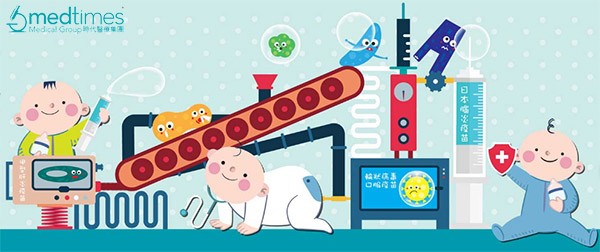When you first hold the little life that has just come into the world tightly, only to find that his skin and the whites of his eyes have become yellow, the heart may be a little alarmed. Don't worry, it could be newborn jaundice.

What is jaundice? Physiological jaundice vs. pathological jaundice
Jaundice, commonly known as yellow disease, is a condition that turns the skin and whites of the eyes yellow. When the body's waste processing system goes wrong, a metabolite called bilirubin in the blood will accumulate excessive, because the proteins in the white part of the eye are more likely to absorb this substance, so the disease usually begins to yellow from the eyes, and then it will appear in the skin, oral mucosa and other parts.
According to statistics, about 60% of full-term infants and 80% of premature infants will experience jaundice.
Hong Kong Times Medical said that jaundice is usually divided into physiologic jaundice and pathological jaundice, but fortunately, most jaundice belongs to physiologic jaundice, usually appears 2-3 days after birth, and the baby eats and sleeps normally, the mental and physical state is not easy to change, without special treatment.
Pathological jaundice, on the other hand, occurs relatively early (generally within 24 hours of birth), progresses rapidly, lasts a long time, and may be accompanied by alarm signals such as drowsiness, milk refusal, and fever, requiring prompt medical attention to check for potential problems such as hemolysis, infection, and biliary atresia.
Can jaundice baby vaccinate? Judge according to the actual situation
The World Health Organization (WHO) and China's "Code of Practice for vaccination" clearly point out that physiological jaundice is not a contraindication of vaccination, but pathological jaundice should be treated with caution.
In general, if the baby has only mild jaundice and no other discomfort (such as fever, severe eczema, etc.), which is physiological, then the vaccination schedule can be carried out as usual, in case a delay in vaccination may increase the risk of infection in the baby.
However, if jaundice is caused by hemolytic diseases, serious infections, liver and bile abnormalities, etc., the baby may need to treat the primary disease first, and then consider the replacement vaccine after the condition is stabilized. For example, neonatal hemolysis (such as ABO hemolysis) requires jaundice to be controlled first, biliary atresia requires priority treatment of hepatobiliary problems, and vaccination needs to be evaluated according to the individual circumstances of the baby.
In addition, breast milk jaundice usually does not affect vaccination, but if the jaundice value is high (e.g., >15 mg/dL), some doctors may recommend monitoring bilirubin levels or light therapy before vaccination until the jaundice has resolved. However, there is no conclusive evidence that vaccination worsens breast milk jaundice.
※ Before vaccination, the doctor will carefully assess the degree of jaundice and the overall health status of the baby, and then consider whether the baby will follow the usual vaccination schedule, so parents are advised to communicate with the vaccination site in advance to understand the specific requirements.
Vaccination Q&A: Frequently Asked Questions about vaccinating babies with jaundice
Q1: jaundice baby vaccination can aggravate jaundice?
A: There is currently no scientific evidence that vaccines cause jaundice to worsen. In individual babies, bilirubin metabolism may be affected by mild discomfort (such as low fever) after vaccination, but it usually recovers quickly.
Q2: How long can I get the vaccine after jaundice?
A: After the physiological jaundice subsides, the baby can be vaccinated at any time, but the pathological jaundice needs to be evaluated by the doctor, and the general bilirubin can be vaccinated after the safe level and the health condition is stable.
Q3: Which vaccines should we pay special attention to?
A: Premature babies or those with severe jaundice may require more rigorous evaluation when receiving the BCG vaccine, but the hepatitis B vaccine is usually unaffected.
Overall, jaundice in infants is common but not scary. As long as parents understand the relevant contraindications for vaccination and follow the doctor's advice, they can provide the best care and vaccination arrangements for their baby to ensure the healthy growth of their baby!

| 
